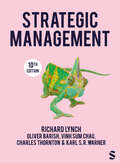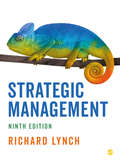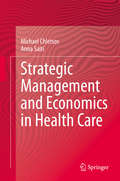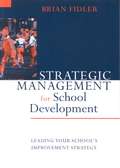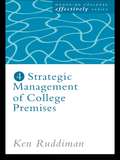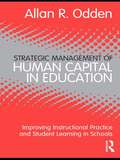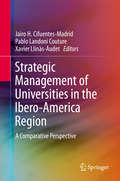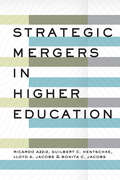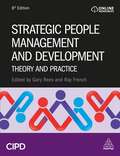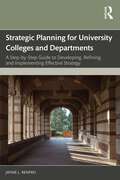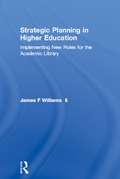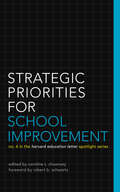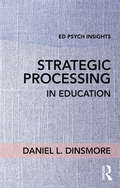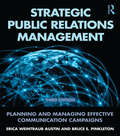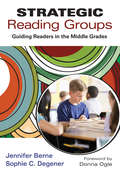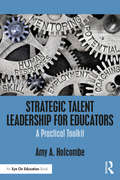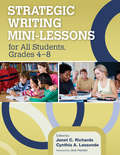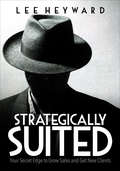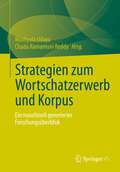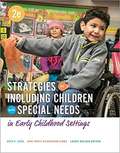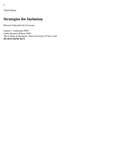- Table View
- List View
Strategic Management
by Richard Lynch Oliver Barish Vinh Sum Chau Charles Thornton Karl S. WarnerTaking a truly international approach, Strategic Management offers you comprehensive coverage of all the core areas of business strategy in a reader-friendly way. Thoroughly updated and with the addition of four brand-new authors, the tenth edition features: • Balanced treatment of prescriptive and emergent models of strategic management. • Application of strategic theory to key areas such as technology and innovation, sustainability, entrepreneurial and public sector strategy. • Cutting-edge content on navigating change in the strategic environment, digital transformation strategies and the role of strategic groups. • 15 brand new case studies showcasing real-life examples from recognisable brands such as Coca-Cola, Airbnb, Apple, Tesla, Toyota, Alibaba, Samsung, Starbucks and UK banks, plus updated case material throughout. • A range of practical tools to support your learning, including summaries of key strategic principles, strategic project ideas, critical reflections, questions and further reading. Suitable for both undergraduate and postgraduate study. Professor Richard Lynch is Emeritus Professor of Strategic Management at Middlesex University, London. Dr Oliver Barish is Lecturer in Management at Birkbeck Business School, Birkbeck, University of London. Dr Vinh Sum Chau is Senior Lecturer in Strategy at Kent Business School, University of Kent. Dr Charles Thornton is Lecturer in Service Operations Management and Business Strategy at Plymouth Business School, University of Plymouth. Dr Karl Warner is Lecturer in Strategy at Adam Smith Business School, University of Glasgow.
Strategic Management
by Richard Lynch Oliver Barish Vinh Sum Chau Charles Thornton Karl S. WarnerTaking a truly international approach, Strategic Management offers you comprehensive coverage of all the core areas of business strategy in a reader-friendly way. Thoroughly updated and with the addition of four brand-new authors, the tenth edition features: • Balanced treatment of prescriptive and emergent models of strategic management. • Application of strategic theory to key areas such as technology and innovation, sustainability, entrepreneurial and public sector strategy. • Cutting-edge content on navigating change in the strategic environment, digital transformation strategies and the role of strategic groups. • 15 brand new case studies showcasing real-life examples from recognisable brands such as Coca-Cola, Airbnb, Apple, Tesla, Toyota, Alibaba, Samsung, Starbucks and UK banks, plus updated case material throughout. • A range of practical tools to support your learning, including summaries of key strategic principles, strategic project ideas, critical reflections, questions and further reading. Suitable for both undergraduate and postgraduate study. Professor Richard Lynch is Emeritus Professor of Strategic Management at Middlesex University, London. Dr Oliver Barish is Lecturer in Management at Birkbeck Business School, Birkbeck, University of London. Dr Vinh Sum Chau is Senior Lecturer in Strategy at Kent Business School, University of Kent. Dr Charles Thornton is Lecturer in Service Operations Management and Business Strategy at Plymouth Business School, University of Plymouth. Dr Karl Warner is Lecturer in Strategy at Adam Smith Business School, University of Glasgow.
Strategic Management
by Richard LynchThe 9th edition of this comprehensive core textbook builds on its global perspective and approachable written style, as it explores the key concepts within a clear and logical structure. Lynch guides you through 19 chapters, with updated case studies and pedagogy that support the modern business and management student from start to finish. Continuous contrast between prescriptive and emergent views of strategy highlights key debates within the discipline, whilst an emphasis on the practical throughout the book helps you turn theory into practice
Strategic Management
by Richard LynchThe 9th edition of this comprehensive core textbook builds on its global perspective and approachable written style, as it explores the key concepts within a clear and logical structure. Lynch guides you through 19 chapters, with updated case studies and pedagogy that support the modern business and management student from start to finish. Continuous contrast between prescriptive and emergent views of strategy highlights key debates within the discipline, whilst an emphasis on the practical throughout the book helps you turn theory into practice
Strategic Management and Economics in Health Care
by Anna Saiti Michael ChletsosThis book offers significant managerial and economic knowledge on hospitals, and will serve as a valuable tool for explaining complicated managerial and economical problems, and for facilitating decision-making processes. It bridges management and economic sciences - two complementary sciences that feed the process of making rational decisions. With particular reference to the education, the main aim of this book is to provide students of relevant schools and departments with the knowledge (managerial and economic) that will enable them to deal both efficiently and effectively with the real problems arising in a health care organization such as a hospital. In particular, by equipping students with appropriate managerial and economic knowledge, the aim is to give them a clear understanding of HOW to deal with the diverse and complex problems of hospitals while at the same time helping them to develop strategic approaches that will make hospitals more efficient and sustainable.
Strategic Management for School Development: Leading Your School's Improvement Strategy (Published in association with the British Educational Leadership and Management Society)
by Professor Brian FidlerVisit our Website to see a sample chapter www.PaulChapmanPublishing.co.uk This practical book introduces strategic management for senior managers in schools. The author: shows how it can contribute to school development; explores the leadership of strategic school improvement; and presents a strategic planning model for schools. At each stage, he deals with practice and shows how this involves the organization of the whole process and the stages of analysis, choice and implementation. Written at a very accessible and practical level, the book focuses on: - how to generate ideas, - communication and managing change, - how to organize staff to work together on strategic planning. Numerous activities are also included, designed to facilitate staff discussion of strategic analysis and strategic choice This book is essential for head teachers, deputy heads, and local authority professionals.
Strategic Management of College Premises
by Ken RuddimanManagement of premises can seem like the most complex and onerous of all tasks facing FE / HE college principals. In fact, the resposibility offers a whole host of challenges and opportunities. This text gives practical guidance to management staff on how to avoid the pitfalls and make the most of opportunities, including: rationalising sites; developing properties; buying and selling land or buildings. Written by the principal of the largest FE college in England, the book is informed by first-hand experience of the problems involved in College Estates Management, and offers advice that has been tried and tested.
Strategic Management of Human Capital in Education: Improving Instructional Practice and Student Learning in Schools
by Allan R. OddenStrategic Management of Human Capital in Education offers a comprehensive and strategic approach to address what has become labeled as "talent and human capital." Grounded in extensive research and examples of leading edge districts, this book shows how the entire human resource system in schools—from recruitment, to selection/placement, induction, professional development, performance management and evaluation, compensation, and career progression—can be reformed and restructured to boost teacher and principal effectiveness in ways that dramatically improve instructional practice and student learning. Strategic Management of Human Capital in Education guides educators towards putting more effective teachers, teacher leaders, and principals in the country’s schools—especially in poverty-impacted urban and rural communities—equipping those teacher and principals with instructional and leadership expertise, and rewarding and retaining those who are successful in attaining these objectives. Drawing from cases, experiences, and deliberations from a national task force, this book outlines a comprehensive framework for how to transform current human resource management practices into authentic, strategic talent management systems in order to improve student achievement.
Strategic Management of Universities in the Ibero-America Region
by Jairo H. Cifuentes-Madrid Pablo Landoni Couture Xavier Llinàs-AudetThis book provides the readers with a map of the higher education systems and strategic management trends in the higher education institutions within countries of the Ibero-America region. The key feature of this volume is the presentation of a conceptual framework as a point of reference for the development of university management systems in a specific context. Furthermore, the book provides an overview of the development of higher education in Latin America and the Caribbean, to advance understanding of the changes observed in the institutional strategic management setting. The book examines and compares the types of strategic management processes used, as well as the models of applicability of strategy-making. This analysis is done by cutting through a critical review of the processes and systems of university management used in the various analysed countries, and pays special attention to the actors involved, the processes, the reporting systems, the expectations and the limitations. Additionally, the book introduces a methodology for the identification and implementation of best practice in university strategic management, and presents practical suggestions about the ways in which processes and models can be used to increase quality and competitive advantage.
Strategic Mergers in Higher Education
by Guilbert C. Hentschke Ricardo Azziz Lloyd A. Jacobs Bonita C. JacobsHow proactive mergers can stabilize and enhance colleges and universities—and ensure their future.With the pool of high school graduates decreasing, national and global competition increasing, and the need to invest in new technologies and approaches growing, many universities and small colleges alike are struggling—not just to thrive, but to survive. In this challenging environment, mergers and consolidations are often viewed as options of last resort. Strategic Mergers in Higher Education, however, argues that college and university mergers are a legitimate and proactive strategic option to help ensure success, maximize quality and service, and yield the best return for faculty and students. In this thoughtful book, Ricardo Azziz and his coauthors—including higher education leaders who have led successful consolidations—address the many questions surrounding institutional mergers. When, they ask—and why—should a merger be considered? How can leaders deal effectively with the many challenges and opposition that a merger will inevitably face? What are the predictors of merger failure and success? And how do we successfully address the postmerger cultural divide?This thorough text demonstrates how mergers can dramatically accelerate the goals of postsecondary institutions. The book is informed by an extensive review of published reports, interviews with over thirty higher education leaders, individual case studies, and the experiences of the authors themselves. Addressing numerous critical questions, this practical guide is aimed at higher education leaders and their boards, the campus leaders charged with executing transformative mergers, and any policy makers interested in change management or the future of higher education.
Strategic People Management and Development: Theory and Practice
by Gary Rees and Ray FrenchStrategic People Management and Development maps to the CIPD Level 7 module 'People Management and Development strategies for performance'. It focuses on the need for evidence-based and outcome-driven practice in the people profession and explains how HR and Learning and Development (L&D) professionals can create value and drive performance in an organisation. It provides a thorough grounding in the theory and practice of how to lead and manage employees and effectively develop a workforce as well as extensive coverage of how to ensure professionalism and ethical behaviour in the people function. This book also includes discussion of organisation development and how high-performance work practices drive positive organisational and employee outcomes. This book also includes practical advice on key HR activities including recruitment, job design,and reward. Fully updated throughout, this book includes case studies to help students see how the theory applies in practice, reflective practice activities to help them think critically about the content and self-test their learning progress as well as 'explore further' boxes to encourage wider reading. Online resources include an instructor's manual, lecture slides, and sample essay questions.
Strategic Planning for University Colleges and Departments: A Step-by-Step Guide to Developing, Refining, and Implementing Effective Strategy
by Jayme L. RenfroThis practical guide contains everything higher education leaders and administrators need to know in order to write simple, effective plans for their colleges and departments.Debunking the traditional notion that intricate, drawn-out planning automatically translates to effective strategy, this book calls for a paradigm shift, urging a move away from mere procedural planning and toward strategic thinking and action. The processes, techniques, and troubleshooting pointers described in this guide ensure strategic planning is a meaningful and impactful practice, empowering academic units to align their efforts with broader institutional goals and realize their full potential in an evolving educational environment.An invaluable resource on writing and maintaining strategic plans for university subunits, this book should have a place on every dean, provost, department head, and program director's shelf.
Strategic Planning in Education: Rethinking, Restructuring, Revitalizing
by Roger Kaufman Jerry HermanEducation is one generation's investment in the next. It is an expensive enterprise and, thus, should become an investment, not simply a cost.
Strategic Planning in Higher Education: Implementing New Roles for the Academic Library
by James F Williams IiIn this refreshing new volume, strategic planning of budget management is looked at with a broad, positive perspective. Whether because of cuts in funding, enrollment decline, or academic cutbacks, the necessity for strategic planning in a university comes out of unfavorable circumstances. The chapters cover the planning process from start to finish, with an emphasis on a final goal of bringing the library’s status from one of an economic competitor to a deserving equal in the eyes of the academic community. The development of programs and long--term goals for various programs with realistic results in mind are stressed in this timely book.Strategic planning can be an effective managing tool in the midst of uncertainty and constant change. Cooperation, collaboration, and communication are all essentials for reaching this goal, and the authors of the 13 chapters describe in detail past instances in which these were successful. Readers will find that several major themes tie the diverse chapters of this book together, such as becoming successful in applying for limited institutional resources; giving the library’s goals a more prominent position among the members of the campus administration; and using the planning exercise to help the members of the academic community better understand the administrative decision-making process. Written by college and university presidents, campus planners, and librarians, this book clearly outlines the methods and benefits of strategic planning and provides an encouraging picture of what can be achieved when the process is used.
Strategic Priorities for School Improvement: No. 6 in the Harvard Education Letter Spotlight Series
by Nancy Walser Caroline ChaunceyOrganized around the four key areas outlined in the U. S. Department of Education's Race to the Top program, Strategic Priorities for School Improvement presents a collection of seminal articles on standards and assessment; using data to improve learning; recruiting and retaining great teachers and leaders; and turning around failing schools. Contributors include Karin Chenoweth, Stacey Childress, Elizabeth A. City, Rachel E. Curtis, Richard F. Elmore, Susan Moore Johnson, Ellen Moir, Richard J. Murnane, W. James Popham, Robert Rothman, Alexander Russo, D. Brent Stephens, and Nancy Walser.
Strategic Priorities for School Improvement: No. 6 in the Harvard Education Letter Spotlight Series (HEL Spotlight Series)
by Caroline T. ChaunceyOrganized around the four key areas outlined in the U. S. Department of Education&’s Race to the Top program, Strategic Priorities for School Improvement presents a collection of seminal articles on standards and assessment; using data to improve learning; recruiting and retaining great teachers and leaders; and turning around failing schools. Contributors include Karin Chenoweth, Stacey Childress, Elizabeth A. City, Rachel E. Curtis, Richard F. Elmore, Susan Moore Johnson, Ellen Moir, Richard J. Murnane, W. James Popham, Robert Rothman, Alexander Russo, D. Brent Stephens, and Nancy Walser.
Strategic Processing in Education (Ed Psych Insights)
by Daniel L. DinsmoreWhile there are certainly numerous influences on individuals’ learning and performance, cognitive strategies are the processes most directly related to making meaningful progress on a learning task or problem. Written by a leading expert on strategic processing, this book situates the topic within the broader context of educational psychology research and theory and brings it to a wider audience. With chapters on the fundamentals of domain-general and domain-specific strategies, connections to other constructs, and advice for instructing students, this concise volume is designed for any education course that includes learning or study strategies in the curriculum. It will be indispensable for student researchers and both pre- and in-service teachers.
Strategic Public Relations Management: Planning and Managing Effective Communication Campaigns (Routledge Communication Series #10)
by Erica Weintraub Austin Bruce E PinkletonStrategic Public Relations Management features an applied approach to evidence-based, strategic public relations management. It emphasizes understanding audiences through research and demonstrates success through quantitative evaluation methods. The volume presents a scientific approach that helps future and current practitioners understand and communicate the value of public relations to others, using performance metrics to demonstrate return on investment. New to the third edition: New examples on the effective use of digital communication and online research tools; Updated guidance on researching using digital tools and social media; New examples that provide a more accessible pathway to real-world application. In addition to these new features, the book covers: Creating a framework for planning; Up-to-date research tools and how to develop a research plan; Gathering useful data for strategic guidance; Real-world examples that provide readers with realistic cases and situations; Applying theory to professional practice. The book's accessibility will be welcomed by instructors and students with definitions of terms, a how-to approach, and an accessible style of writing throughout.
Strategic Reading Groups: Guiding Readers in the Middle Grades
by Jennifer I. Berne Sophie C. DegenerDifferentiated reading instruction: An effective model for the middle grades Strategic grouping can transform reading instruction in the middle grades from a hit-or-miss learning experience to a targeted, responsive one. This book features a practical and field-tested model for small-group differentiated reading instruction in Grades 4–8. The authors offer a clear, detailed discussion of how to position this instruction inside middle school language arts or reading classrooms and simple, effective strategies for classroom management, groupings, and assessment. This text explains how to: Balance brief strategic reading lessons with whole-class work Structure and guide reading groups consistently Assess students before and during reading groups Cue students and gauge understanding as they read
Strategic Talent Leadership for Educators: A Practical Toolkit
by Amy A. HolcombeThis book is designed to support the transformation of educators into strategic talent leaders. The author’s research-based "Strategic Talent Leadership Framework" gives leaders the tools for acquiring, accelerating, advancing and assessing educator talent. Each chapter features an illustrative case, best practices, a ready-to-use tool for advancing those practices, a set of "talent analytics" and an action step planner. This guidebook is for education leaders who seek to assess current performance, adopt research-based strategies for engaging in strategic human capital practices, set goals around the use of those practices and measure the impact of their work on student outcomes. Accessible and actionable, Strategic Talent Leadership for Educators is not only a guide, but a toolkit for putting research into practice.
Strategic Writing Mini-Lessons for All Students, Grades 4–8
by Dr Janet Richards Dr Cynthia A. LassondePower up writing instruction with short, differentiated lessons! The hard reality? By the time they reach middle school, many of our students still lack basic writing skills, and this is their last opportunity to get up to speed before they reach high school. This toolbox of 23 mini-lessons will help you intervene and develop confident, competent writers. You'll find: Proven lessons that develop four essential writing strategies: inventing, drafting, revising, and editing Adaptations for struggling writers, English Language Learners, and advanced writers, with visual tools A schematic linking lessons to Common Core grade-level goals
Strategically Suited: Your Secret Edge to Grow Sales and Get New Clients
by Lee HeywardA style expert reveals how clothes can make a difference in our business success—and open up a new world of opportunities. The way people present themselves is a secret sales weapon. It gives them an edge within their industry. And all they have to do to activate that edge is change their clothes. Strategically Suited helps you grow your business or advance your career by making a great first impression—and as a bonus, looking your best can give you a new and powerful confidence. With advice that can work for men or women, and an emphasis on staying true to your own style, longtime image and sales strategist Lee Heyward shows that when you up-level your look, you&’ll feel great, have more fun—and close more business.
Strategien zum Wortschatzerwerb und Korpus: Ein maschinell generierter Forschungsüberblick
by Muthyala Udaya Chada Ramamuni ReddyDieses Buch untersucht den Bereich der ESL/EFL-Wortschatz- und Korpusstudien aus fünf umfassenden Perspektiven: Erwerb, Strategien, IKT, Korpus und aktuelle Praktiken. Die fünf Abschnitte des Buches sind so gruppiert, dass eine ausgewogene Abdeckung der Beschreibungen, wie Vokabeln erworben werden, und der verschiedenen Strategien, die von Lernenden und Lehrenden eingesetzt werden, um den Wortschatz zu beherrschen, erreicht wird. Einer der Abschnitte befasst sich mit dem Einfluss der Informations- und Kommunikationstechnologien auf das Lernen und neue Lehrmethoden. Der Abschnitt über das Lehren und Lernen von Korpus und Wortschatz enthält Zusammenfassungen darüber, wie Korpora die Sprache der Lernenden sein können und wie sie sich direkt auf den Unterricht auswirken. Der letzte Abschnitt über aktuelle Praktiken und Forschung beleuchtet die von Lehrenden und Forschenden angewandten Praktiken bei der Entwicklung des Themas Wortschatz. Dieses Buch ist eine wertvolle Ressource für Forschende, Lehrende und Sprachmittler*innen, die sich für die Natur des Wortschatzes im ESL/EFL-Lehr- und Lernkontext interessieren.
Strategies For Including Children With Special Needs In Early Childhood Settings (Mindtap Course List)
by Ruth E. Cook Anne Marie Richardson-Gibbs Laurie NielsenThis practical, hands-on-guide encompasses workable ideas on how to include and support young children with disabilities in all preschool classrooms. Teaching strategies and adaptations are offered by program activity rather than by disability, so you can more easily coordinate adaptations to each part of your lesson plan. The main focus is on embedding instruction within daily routines. The text incorporates simple and direct language that builds on the foundation of information learned about children without disabilities. Chapters are short and include many examples for supporting children with a variety of common disabilities such as cerebral palsy, Down syndrome, autism, visual impairment, hearing loss, and behavioral challenges. Whether you're a student working in general or special education, you will find the strategies, helpful hints, and scenarios to be useful resources when accommodating children with special needs in your current or future classroom.
Strategies For Inclusion: Physical Education For Everyone
by Lauren J. Lieberman Cathy Houston-WilsonTransitioning students with disabilities into inclusive physical education environments is an important and sometimes challenging task. ButStrategies for Inclusion, Third Edition,makes that transition much smoother and better for all parties involved. Lots of New Resources and Material The latest edition of this popular adapted physical education text will empower you with the information and tools necessary to successfully include students with disabilities in your program.Strategies for Inclusionreflects the latest research and legislation, so you can be sure that your program is not only successful but also compliant with the goals and requirements of the Individuals with Disabilities Education Improvement Act. The text has retained and updated its instruction on assessing students, making placement decisions, developing and implementing individualized education plans (IEPs), and more. And it offers this completely new material:A new chapter on the referral, eligibility, and placement process, covering the nine steps required by lawAnew chapter on transition planningand how you can help students integrate into their communities after leaving schoolAnew section on Paralympic sportsand how they can be infused into your curriculumNew materialon functional behavioral assessments, behavior intervention plans, leadership opportunities, training techniques for peer tutors and paraeducators, and moreA newinclusion rating scalethat will help you rate how inclusive your classes are and show you areas for improvementAnew web resourcewith numerous useful toolsMore than double the number of teaching units(38 units, up from 17), giving you more options for inclusionThe new web resource offers fillable digital versions of all the modification checklists and rubrics in the book. You can save materials in order to build an IEP for each student. You can also access the materials on a mobile device to use them in the classroom or gym. In addition, the web resource has an interactive inclusion rating scale that allows you (or an administrator) to assess how you are doing at including all students in class activities. This handy tool calculates your total rating as you fill in the form. Finally, the web resource directs you to high-quality adaptation information available elsewhere online.
